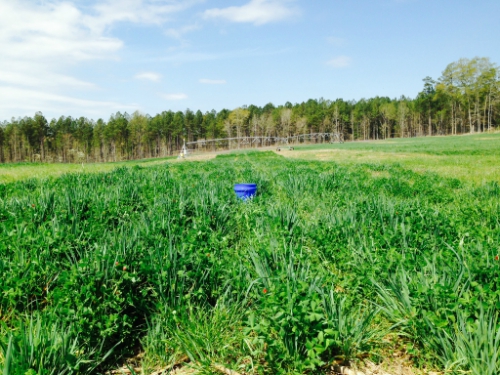How Should I Terminate My Cover Crop?
 There are three basic cover crop termination practices:
There are three basic cover crop termination practices:
Additionally, some cover crop species may Winter or Frost Kill or can be eliminated with Heavy Grazing.
Herbicides alone, or in some combination with rolling and crimping, are commonly used in row crop production. Rolling and crimping or mowing and incorporation are more commonly used in certified organic row crop production.
A few cautionary notes apply to all systems:
- Adequate cover crop termination is important. This prevents the cover crop from becoming an unwanted plant in the production system (that is, a weed!). Poorly terminated cover crops will compete with the cash crop, interfere with planting, harbor pests and diseases, and produce viable seeds that can germinate at unwanted times.
- All cover crops should be terminated prior to seed set, unless the specific goal is to reseed that particular cover crop. Some termination methods, like rolling and crimping WITHOUT herbicides, are only effective when the plants are in full flower. Attempts to terminate the cover crop too early, before full flower, will lead to the cover crop surviving. Plants in full flower are very close to producing viable seeds. If cover crops are terminated too late, viable seeds can be produced that can become a problem in the following the cash crop. Volunteer hairy vetch in winter small grain production systems is an example.
More Information:
- A Simple Guide for Conservation Systems in the Southeast. USDA ARS
- Termination of Cover Crops: Management Considerations for the Subsequent Cash Crop. Conservation Systems Fact Sheet No. 11. USDA ARS
Contributors:
Dr. Charlie Cahoon, Extension Specialist – Virginia Tech; Dr. Stanley Culpepper, Extension Specialist – University of Georgia; Dr. Mike Flessner, Extension Specialist – Virginia Tech; Julia Gaskin, Extension Specialist – University of Georgia; Dr. Erin Haramoto, Assistant Professor – University of Kentucky; Dr. Andy Price, USDA Agricultural Research Service; Dr. Mark Reiter, Extension Specialist – Virginia Tech; Dr. William Vencill, Professor – University of Georgia; Dr. Lisa Baxter, Extension Specialist – University of Georgia; Dr. Nick Basinger, Assist. Professor – University of Georgia; Sarah Seehaver, Research Specialist – North Carolina State University; Dr. Dara Park, Assoc. Professor, Clemson University
